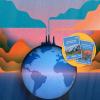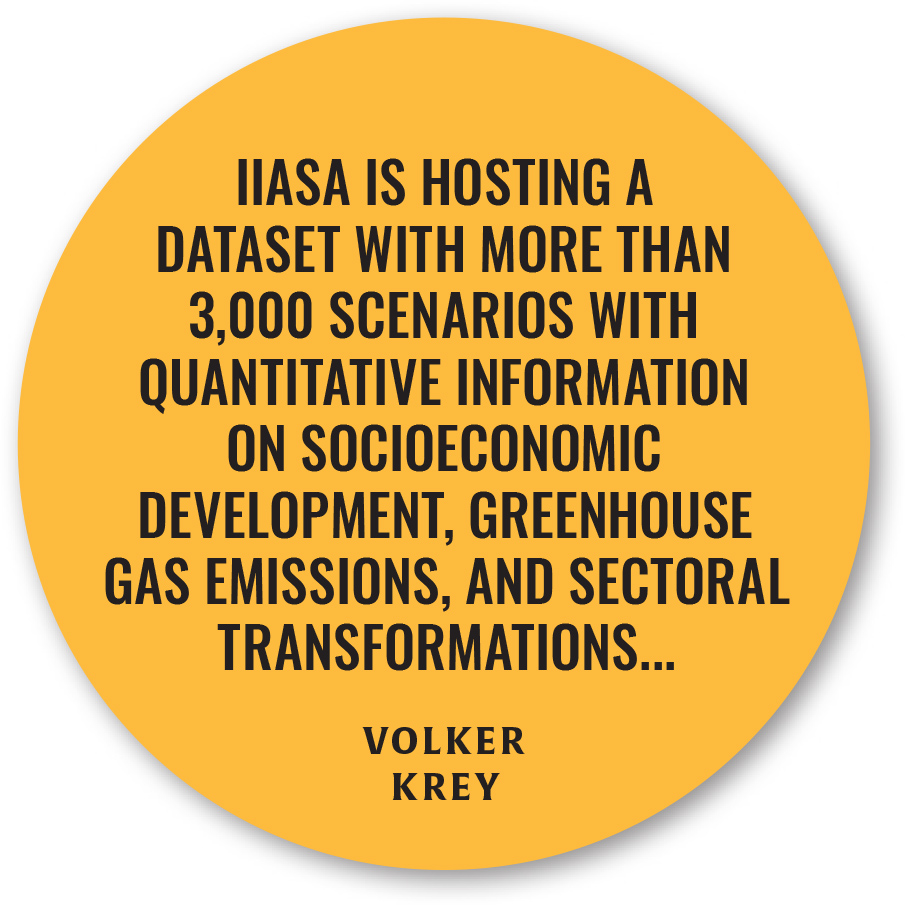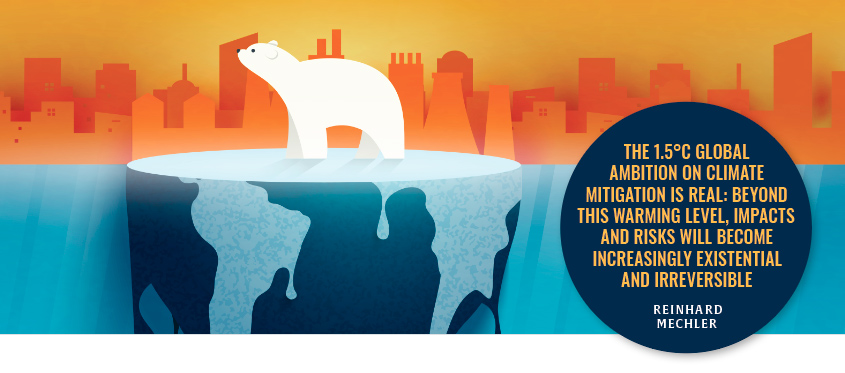
Options Magazine, Summer 2022: We take a closer look at the institute’s role in the Intergovernmental Panel on Climate Change (IPCC), highlighting how participation and input by IIASA not only contributes to, but supports the scientific foundation of reports by this highly influential organization.
Pioneering IIASA research into climate change in the 1970s and 1980s played a key role in establishing the Intergovernmental Panel on Climate Change (IPCC) in 1988. Since then, IIASA scientists have been authors and reviewers of all IPCC assessment reports with their participation and input not only contributing to, but also supporting the scientific foundation of these reports.
As a multidisciplinary, international research institute conducting policy-oriented research into issues that are too large or complex to be solved by a single country or academic discipline, IIASA is fertile ground for producing IPCC authors. However, the institute’s contributions to climate science stretch back even further.
Breaking new ground in climate science
A key conference held by IIASA under the theme, “Carbon Dioxide, Climate, and Society” in 1978 culminated in one of the earliest international assessments of the climate problem, with 40 authors from 11 countries contributing technical papers.
Many of the issues raised at that seminal 1978 conference have been included in IPCC assessment reports over the years and are still discussed today. This includes, among others, the use of alternative, renewable energy sources such as biomass; carbon capture and storage; how to reduce the world’s energy demand—and even uncertainty, which dominated and still dominates every aspect of climate change from emission rates, through environmental consequences to the socioeconomic impacts themselves.
Apart from contributions to these and other critical climate related topics, IIASA continues to set itself apart as more than just a participant in IPCC assessments through innovative research in the climate change arena. Among these is a flagship publication by IIASA researchers in Nature Climate Change in 2021, summarizing the community effort on attainability and costs of climate targets. This work critically informed the IPCC Sixth Assessment Report and includes about 40% of all scenarios of the community scenarios that were assessed. IIASA also organized an IPCC scenario expert workshop in preparation of the Sixth Assessment Report with more than 100 experts, and hosts the Scenario Explorer and databases underlying the Fifth and Sixth Assessment Reports, as well as the Special Report on 1.5°C as part of a memorandum of understanding with the IPCC and the Integrated Assessment Modeling Consortium.
“One of the main challenges in climate modeling and scenarios is bridging from science to policy from the long-term global to the short-term local, and back. IIASA’s impact stands robustly on scalable modeling approaches simultaneously serving scientific assessments as well as national policymakers and regulatory processes, which continuously inform each other,” says Integrated Biosphere Futures Research Group Leader Petr Havlík, a lead author on the Sixth Assessment Report.
 © IIASA
© IIASA
Setting the tone at a crossroads for humanity
Humanity currently finds itself at a crossroads. While we have the tools and know-how required to limit warming and climate action is being taken in many countries, policies, regulations, and market instruments need to be scaled up and applied more widely and equitably to ensure that they effectively support deep emissions reductions and stimulate innovation.
The IPCC Sixth Assessment Report features an unprecedented 32 IIASA researchers spread across all three working groups in various capacities including coordinating lead authors, lead authors, and contributing authors.
“In addition to contributing to the assessment of the literature, IIASA researchers have been helping to improve the quantitative basis for the scenario assessment in the Working Group III Report. Building on previous experience in the Fifth Assessment Report and the Special Report on Global Warming of 1.5°C, IIASA is hosting a dataset with more than 3,000 scenarios with quantitative information on socioeconomic development, greenhouse gas emissions, and sectoral transformations across energy, land use, transportation, and industry,” explains Integrated Assessment and Climate Change Research Group Leader, Volker Krey.
The Working Group I contribution to the Sixth Assessment Report released towards the end of 2021 addressed the most up-to-date physical understanding of the climate system and climate change, pulling together the findings from more than 14,000 peer-reviewed studies. One of the key developments since the fifth assessment cycle is the strengthening of the links between human-caused warming and increasingly severe extreme weather. The report relied on the output from the latest generation of global climate models, produced as part of the sixth Coupled Model Intercomparison Project (CMIP6), to which IIASA also contributes.
“Climate change is already affecting every region on Earth and in multiple ways, with human influence contributing to many observed changes in weather and climate extremes. Changes we experience will increase with further warming and they will intensify with every added ton of CO2. While there is no going back from some changes in the climate system, some can still be slowed or stopped by limiting warming – it is in our hands. We will never get tired of stressing that to achieve that, strong, rapid, and sustained reductions in CO2, methane, and other greenhouse gasses are necessary. This would not only reduce the consequences of climate change but also improve air quality and reduce ecosystem impacts,” says IIASA Pollution Management Research Group Leader Zbigniew Klimont, lead author on the Working Group I chapter on short-lived climate forcers.
The Working Group II report examined the impacts of climate change on nature and people around the globe, exploring future impacts at different levels of warming and the resulting risks, and offering options to strengthen nature and society’s resilience to ongoing climate change. The report introduced several new components: a strong focus on opportunities for adaptation and risk management as well as their limits; a special section on climate change impacts, risks and options to act for cities and settlements by the sea, tropical forests, mountains, biodiversity hotspots, dryland and deserts, the Mediterranean, as well as the Polar Regions; and an atlas that will present data and findings on observed and projected climate change impacts and risks from global to regional scales, offering even more insights for decision makers.
 © Adam Islaam | IIASA
© Adam Islaam | IIASA
“The cumulative scientific evidence of this report is indisputable: climate change is a threat to human wellbeing and the health of the planet. While action on adaptation (and mitigation) is being taken across the world, there are growing gaps with regard to avoiding and reducing risks, as well as dealing with unavoided and unavoidable impacts and risks. Adaptation limits will soon be reached in both natural and human systems without urgent action on adaptation and Loss and Damage. The 1.5°C global ambition on climate mitigation is real: beyond this warming level, impacts and risks will become increasingly existential and irreversible,” says IIASA Systemic Risk and Resilience Research Group Leader Reinhard Mechler, a lead author on the chapter on decision-making options for managing risk.
The bulk of IIASA contributors to the Sixth Assessment Report worked on the Working Group III report released in April this year, where IIASA researchers’ considerable expertise in climate change mitigation was put to good use to provide an updated global assessment of climate change mitigation progress and pledges, and to examine the sources of global emissions. A major new component of the Working Group III report is a new chapter on the social aspects of mitigation, which explores the factors that drive consumption and greenhouse gas emissions. The report also provides a richer coverage of differences in regional and household level emissions patterns.
“The report shows that the least developed countries have not contributed significantly to past global greenhouse gas emissions, nor are they doing so now. Providing universal access to modern energy services in regions that still lack access to decent living standards is possible without significant implications for global emissions growth,” notes chapter lead author Shonali Pachauri, who leads the Transformative Institutional and Social Solutions Research Group at IIASA.
Since the release of the Working Group III report, IIASA authors have been actively engaging with various actors across the climate change community to present and clarify the findings of the report and to emphasize the importance and urgency of climate action to ensure a livable future for all of humanity.
“IIASA can be proud of the diverse contributions of its researchers shaping many of the key conclusions and insights of the IPCC reports. In addition to hosting the underlying scenario data of the IPCC Working Group III, IIASA researchers have helped to bring new elements into the assessment, such as the new chapter on demand-side solutions or the systematic feasibility assessment of the assessed mitigation pathways. The IPCC reports are very clear about the urgent need for deep and sustained emissions reductions and how to achieve them in all sectors of the world. The ball is now in the court of the decision makers. I hope they understood the messages and will initiate the required actions,” concludes IIASA Energy, Climate, and Environment Program Director, Keywan Riahi.
By Ansa Heyl




